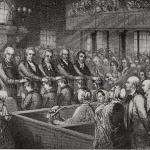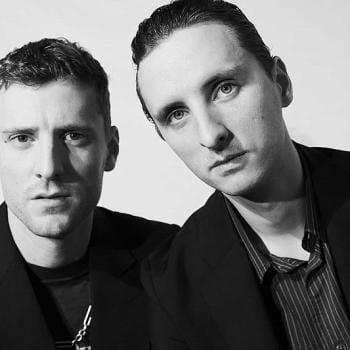The reason for asking is that Reformed Protestants (the better name for Calvinism) don’t believe in the freedom of the will and most Americans believe that self-determination is as natural as a Big Mac. University of Notre Dame sociologist, Christian Smith, described the American notion of freedom this way (though he was also speaking about his profession, the academic study of society):
American sociology as a collective enterprise is the realization of the emancipation, equality, and moral affirmation of all human beings as autonomous, self-directing, individual agents out to live their lives as they personally so desire, by constructing their own favored identities, entering and exiting relationships as they choose, and equally enjoying the gratification of experimental, material, and bodily pleasures.
If Reformed Protestants teach that the will is in bondage, a slave to sin, how can they possibly affirm human beings as autonomous, self-directing, individual agents?
Some Southern Baptists who worry about a Reformed coup within the Southern Baptist Convention also object to a theology that rejects the freedom of the will:
While Calvinists are free to believe God created man with compatible freedom, the evidence of Scripture seems to be that man is created with otherwise choice, and thus blessing and judgment are understandably contingent upon the choice that man makes. One may peruse well-known Calvinist commentaries and, quite contradictory to the basics of Calvinism, see such recognition in them. Additionally, there simply is a glaring absence of Scripture wherein God says He made us in such a way as to only be able to choose one thing. That is a misguided philosophical assumption of Calvinism rather than a testimony of Scripture.
That people balk at the idea that human nature cannot choose God or do good freely is understandable. So is the idea that people are lost in sin and still responsible for their actions. If a person isn’t free to choose or reject God, how can that be fair, and how can he be held responsible for his act?
Objections like this to Calvinism, however, miss a bigger problem — it’s called original sin. Because of the fall, a condition passed on to everyone born after the fall, all people (except Jesus — Roman Catholics extend the circle to Mary via the Immaculate Conception) come into the world incapable of choosing virtue or grace. We are born inherently sinful and selfish. This is not simply Calvinist but Christian.
Here is an excerpt from the Roman Catholic Catechism:
1731 Freedom is the power, rooted in reason and will, to act or not to act, to do this or that, and so to perform deliberate actions on one’s own responsibility. By free will one shapes one’s own life. Human freedom is a force for growth and maturity in truth and goodness; it attains its perfection when directed toward God, our beatitude.
1732 As long as freedom has not bound itself definitively to its ultimate good which is God, there is the possibility of choosing between good and evil, and thus of growing in perfection or of failing and sinning. This freedom characterizes properly human acts. It is the basis of praise or blame, merit or reproach.
That sounds positive, but then comes the need to address the fall:
1739 Freedom and sin. Man’s freedom is limited and fallible. In fact, man failed. He freely sinned. By refusing God’s plan of love, he deceived himself and became a slave to sin. This first alienation engendered a multitude of others. From its outset, human history attests the wretchedness and oppression born of the human heart in consequence of the abuse of freedom.
Wow! Men are slaves thanks to the fall. That doesn’t sound like freedom.
Lutherans also took a corrupt human nature seriously, as the Augsburg Confession indicates:
Of Free Will [Protestants] teach man’s will has some liberty to choose civil righteousness, and to work things subject to reason. But it has no power, without the Holy Ghost, to work the righteousness of God, that is, spiritual righteousness; since the natural man receiveth not the things of the Spirit of God, 1 Cor. 2:14; but this righteousness is wrought in the heart when the Holy Ghost is received through the Word. . . . They condemn the Pelagians and others, who teach that without the Holy Ghost, by the power of nature alone, we are able to love God above all things; also to do the commandments of God as touching “the substance of the act.” For, although nature is able in a manner to do the outward work, (for it is able to keep the hands from theft and murder,) yet it cannot produce the inward motions, such as the fear of God, trust in God, chastity, patience, etc.
This paragraph concedes that people can do some good things — work and not steal, kindness to others instead of murder. But these are only external or civil forms of goodness. They can’t qualify as righteous before a holy and righteous God who punished Adam and Eve for a seemingly minor act of eating forbidden fruit.
With Roman Catholics and Lutherans indicated that notions of free will need to be qualified, readers will be well prepared for Presbyterian teaching which puts the T in Total Depravity as the Westminster Larger Catechism reveals:
Q. 21. Did man continue in that estate wherein God at first created him?
A. Our first parents being left to the freedom of their own will, through the temptation of Satan, transgressed the commandment of God in eating the forbidden fruit; and thereby fell from the estate of innocency wherein they were created.Q. 22. Did all mankind fall in that first transgression?
A. The covenant being made with Adam as a public person, not for himself only, but for his posterity, all mankind descending from him by ordinary generation, sinned in him, and fell with him in that first transgression.Q. 25. Wherein consisteth the sinfulness of that estate whereinto man fell?
A. The sinfulness of that estate whereinto man fell, consisteth in the guilt of Adam’s first sin, the want of that righteousness wherein he was created, and the corruption of his nature, whereby he is utterly indisposed, disabled, and made opposite unto all that is spiritually good, and wholly inclined to all evil, and that continually; which is commonly called original sin, and from which do proceed all actual transgressions.
The problem for Baptists who don’t like determinism and election is that if God does not choose to save man (which points you in the direction of predestination), no one is going to heaven because no one has the capacity to choose God, virtue, grace, or holiness.
That’s the problem for those who criticize freedom of the will. If you take the fall and sin seriously, you wind up with what Luther called “the bondage of the will.” It may not be American, but it is Pauline, Augustinian, Lutheran, and of course, Calvinist.












